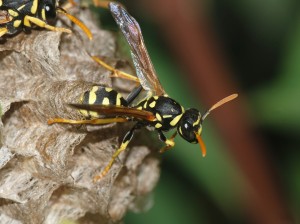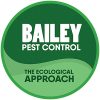
As summer arrives and the weather warms up, many of us will be enjoying the great outdoors with family and friends. The warm weather also encourages some unwanted guests to our homes and businesses – wasps. Most active in the summer months, the Common Wasp and German Wasp are easily identified by their distinct black and yellow colouring and can both deliver painful stings. Although only the female stings, she can do so repeatedly. For some, a wasp sting can trigger a severe allergic reaction, which in a handful of cases can prove fatal.
Both species are very common across Sussex, where they can sometimes be seen in large numbers patrolling beaches and gardens searching for sweet food. So what is the best way to deal with a wasp infestation?
Watch out for nests
Wasps build nests in a variety of places outdoors, including sheltered spots such as under eaves. However, if they can gain access, wasps will also build indoors – loft spaces, wall cavities and sheds are often selected as they can nest relatively undisturbed. Often these can be spotted by observing wasp activity but in some cases, the nest can be concealed or inaccessible.
Nest building begins early in the spring when the Queen lays her eggs over the following few months, increasing the size of the colony. As the larvae hatch, the new workers continue to build and expand the nest, engulfing it with wasp paper until it can reach eight tiers thick.
By early autumn, the colony could contain several thousand wasps. By this time, sugary food offerings dwindle so the workers become more aggressive as they search for high energy nutrition. The founding Queen will eventually die, but the new queens will hibernate over winter and re-emerge the following spring.
Take action as early as possible
Treating the problem sooner rather than later is advised – before the nest becomes too large. Whilst there are DIY products available, it is best to seek professional help as the nests can be dangerous and suitable protection should be worn to protect from stings. At Bailey Pest Control, we are fully equipped to deal with these stinging pests quickly and efficiently, minimising the risk to your family members at home or business customers. Click here to find out more about our services.
So how do we do it?
Treatment involves the application of an insecticide dust that can be reapplied if necessary, but the nest itself is not removed as these are not recolonised the following year.
If you suspect you may have a wasps nest close by, don’t delay. Call us now to arrange an appointment on 07791915502 or 01273 775941 or email john@baileypestcontrol.co.uk

